|
Could this change the rinsing habit? Could this soothe the tension between the rinsers and the dunkers? Europeans (Latins) eat differently. Anglo-Saxons are taught to leave something on the plate for Mr Manners. I was taught that taking a small portion meant that we could willingly accept a second helping and thus compliment the cook. A clean plate showed you had enjoyed it. At home it was expected that your plate would be wiped clean with a piece of bread. If you were "posh", you might put the bread on the end of your fork. (Not done in formal situations of course.) In French, it's "saucer l'assiette". In Italian you use your "scarpetta", a piece of bread, (a little shoe) to clean up that last bit of sauce. Even more fun, in Gascony (S.W. France) they "chabrot", a peasant tradition that is now followed only in historic or traditional celebration. Suggested not to be done on a first date or with your Aussie in-laws. When having soup or a brothy casserole or stew, leave a little at the bottom of your plate. Pour in some red wine. Swirl the wine around to gather together all the juices and then drink, from the bowl, of course. Plate rinsed!
See an elegant demonstration... https://www.youtube.com/watch?v=iDL_H2YCynw COMMENT 👇🏾
1 Comment
Not one of the more attractive images on this blog. Left: the plates after a meal of braised rabbit in red wine with green olives & grilled polenta. Right: the next day, clean and ready to be put away. BUT - these are old plates with a gold rim. (Next piece for special instructions.) At an early age, (I was nine) I knew I wanted a dishwasher; wanted it more than any other appliance. This was not because I was care-worn or watched my mother wear herself out. We had a happy household of shared chores. My father didn't "help", he "did". Washing up was a jolly four-person affair. (We didn't have a television until I was twenty.) What turned me was seeing the machine, arrogantly sitting in the shop-front of the department store, dealing with a load of dishes and into which had been placed a fully-iced, three-tier chocolate cake. Great gimmick, great selling point. Are you a rinser or a scaper? Do you thoroughly rinse your dishes before loading them or do you bung dirty dishes straight into the racks? This is a conundrum that can divide families, tear apart friendships and take asunder a civil society. Basically, it seems that you should stop pre-rinsing - particularly if you want your machine to do a good job, but mainly because it's a terrible waste of water (which I'm sure you care about). A certain detergent company currently uses the massive waste of pre-rinsing as it's main selling point, playing on our guilt for their own ends certainly, but it does, nonetheless make sense. Scrape, don’t rinse. "There's absolutely no need to pre-rinse," says Ashley Iredale, a whitegoods expert at consumer advocacy group CHOICE, and an adamant anti-rinser. "All you need to do is scrape off solid food. The dishwasher will clean off the rest. If you pre-rinse your dishes, you may actually fool your dishwasher into thinking you only need the lightest of washes," Mr Iredale explains. Modern dishwashers have an "intelligence“ that measures the soil level and adjusts the cycle based on that, (which explains why my machine does either a 29 or a 33 minutes shift). “Modern detergents clean by clinging to leftover food," says a Mr Tarrant, category director for Bosch dishwashers (2020). Nothing to grab? No left-over cling, no clean. Germs? The high temperatures of the dishwasher ensures the load is hygienically clean; better than a rinse of luke-warm water from the tap. 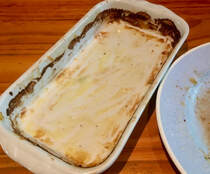 Left: Nasty - this gratin dish (baked-on crusty cheese & breadcrumbs) was soaked overnight. Loaded next day, it came out clean. Can't ask better than that. Do's and Don'ts... Some food sticks if it gets an extra “cooking” from the heat of the water e.g. egg and floury things like pasta and porridge. Give it special scrape. Never put in wooden items like stirring spoons or chopping boards. Old glassware can be damaged. (More later.) Clean out the strainer/filter, often, PLEASE! We tried the fast cycle (29-33 mins) and found it perfect, even for saucepans. Have you tried yours? Worried about leaving dirty dishes overnight? Worried about smells? Use the machine's pre-rinse cycle. You'll still be saving water.
For a special treat, cut a lemon in half, skewer it to one of the racks and press the button. Small household? Small load and you don't want to leave it for a day to add more? Run a machine rinse cycle or just for the hell of it, the full cycle. I've started living dangerously and running a half-load. This is still not using the amount of water of a hand pre-rinse. Let's save water. "Dishwashers are far more water and energy efficient than washing by hand," according to Tarrant (Bosch). Even a quick rinse before loading involves using a whole lot of extra, unnecessary water - 30-40 litres, (compared to 6-10 litres for a complete wash in the machine). A "thorough" wash by hand in the sink (rinsing, washing then final rinse) uses even more, 80% more water than the washing machine. If using the machine, why add to the water consumption by pre-rinsing? You care about garbage recycling, you divide out your glass from your paper from your plastic. You have a compost heap. You don't buy fruit in plastic packaging. You take your own shopping bags to the supermarket. You've cut down/cut out eating meat. You've given up farmed salmon. You recycle elastic bands and wrapping paper. So... Why pre-rinse? Life too easy? Not enough to do? Worried about germs? Not enough dishes to make up a full load? Old habits die hard? Worried your mum wouldn't like it? Cook a meal, enjoy it with friends. Let your machine do the nasty work of washing up. (One of many, many related articles - Ditch the Rinse.) Share your bad habits. Comment below. 👇🏾 Looking into the question of pre-rinsing or not rinsing for the dish-washer (next post) I realise how much we dislike change. We want something different, as long as it reminds us of what we know. Handy Hints are now called hacks, I believe. Larry David, co-writer of the sit-com Seinfeld, gave me (not personally) two of the best life hacks ever, which I have used regularly to my advantage ever since.
Yes, I aim to disturb, to question. But a suggestion comes from a simple observation. It is not a rule, not an edict, not an injunction nor an ultimatum. I've suggested for example, a different way to arrange cheese on a plate (11th Jan, 2018). A friend commented archly that a famous chef on TV (Celebrity Chef, Master Chef, Chef Extraordinaire, TV chef, not sure which) had not done this. (Perhaps I could advise him; he might like my idea.) But it's not a rule. Carry on serving your cheese on hefty 15 kilo planks of Huon Pine, if you wish. So before I set off to delve into the murky world of unwashed dishes, I'll leave you with the simplest and possibly the best cooking tip I've ever received. The major-domo at Orlando Winery's city headquarters (now a row of high-rise appartments) was ultra conservative, a committed believer in the crisp white shirt, polished hair, and the dignity of service. He was a master of the malapropisms. (He was "rape-able" when asked to change a table setting. Small wineries were "petique".) But I think warmly of Maurie whenever I cook green beans. Have the water at a rolling boil. Add half a teaspoon of salt, half a teaspoon of olive oil, throw in the beans for six minutes. Drain and serve.
The oil is the miracle. It leaves a glossy film on the beans - beautiful. (Let me know.) Share some simple tips. (Comments 👇🏾 in blue below.) 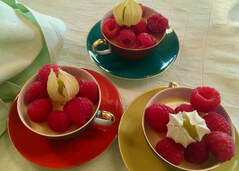 Lemon Posset with fresh raspberries and one (only one) home-grown Cape Gooseberry (Physalis), served in minute, harlequin-coloured demi-tasse coffee cups (c. 1958 Arzberg), the tablecloth a delicious pale green - my mother's (pre WWII - French). A tiny, sweet finish for when you've really had enough. (Lemon Posset - an old-fashioned "pudding" of cream, sweetened and "set" with fresh lemon juice. THE TABLE HAS BEEN EMPTY
The first dinner after "lockdown" was at this very sparse table, with a favourite cousin; three of us still social distancing at a table opened up for eight. Fortunately, all three of us are quite vocal. We're beginning to see normal again in Australia (at least), while aware that stillness and solitude continue for friends and relatives in America, France, Britain and Denmark. I've taken up the keyboard again, at last. For many months, as well as suffering from a general numbness, it seemed irrelevant to talk about, even with a wry smile, the placing of cheese on a plate, getting children to eat their greens and holding their cutlery "correctly" , the trials of feeding the sour dough starter. But I continue to obsess, to cringe, to observe and to be moved. I'll be working on...
|
Categories
All
|
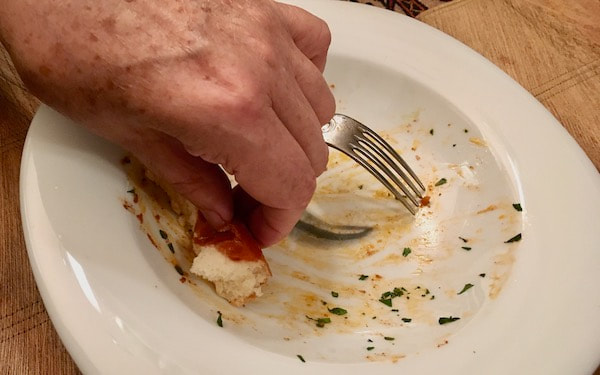
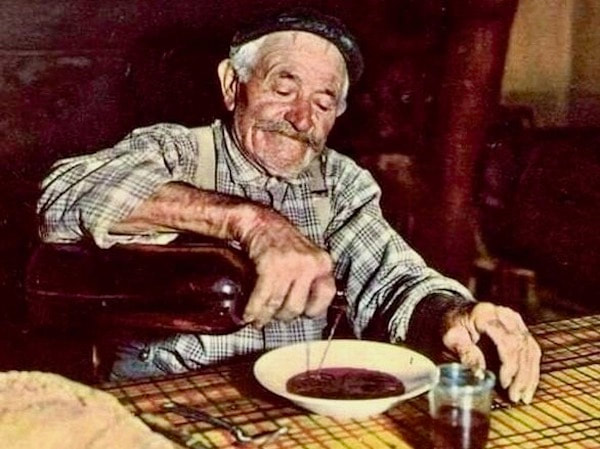
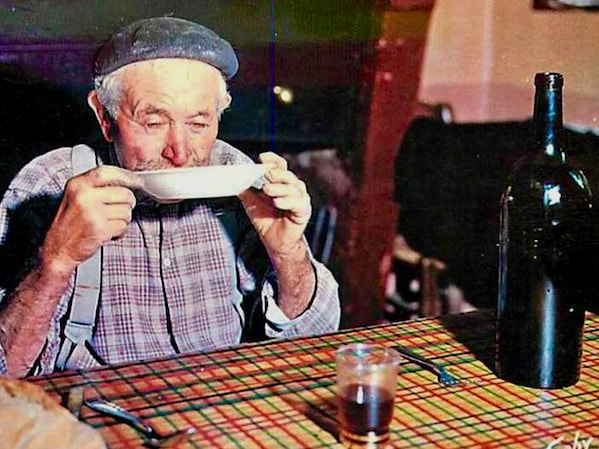
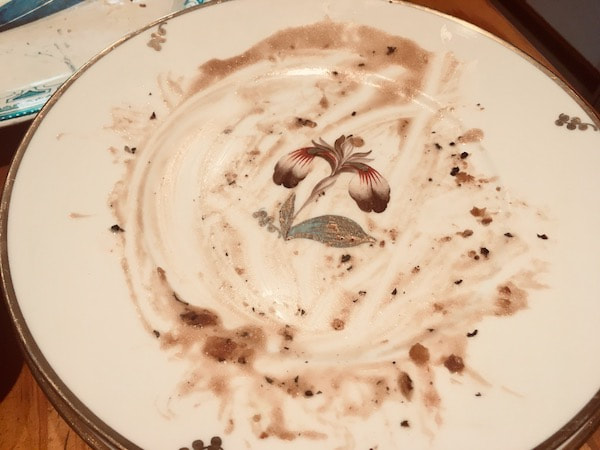
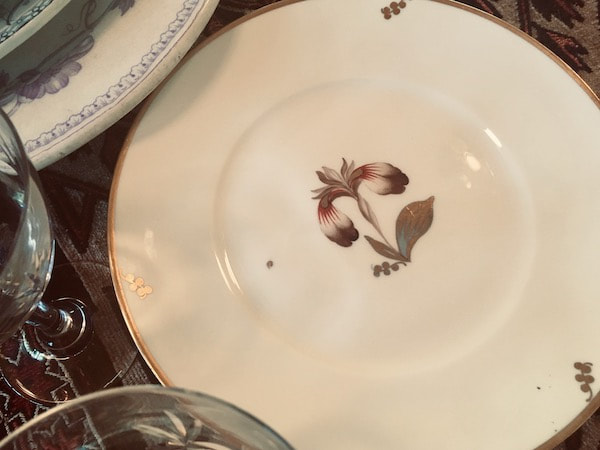
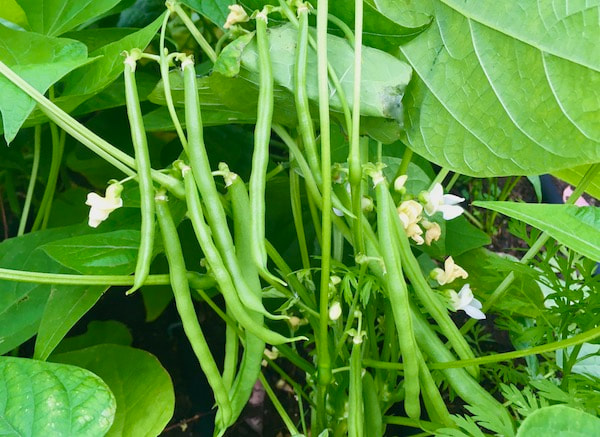
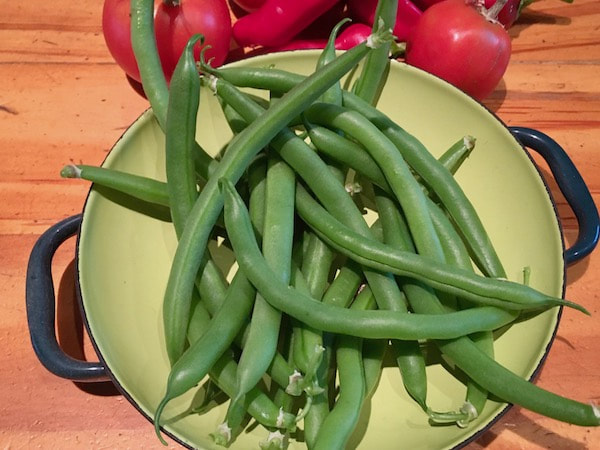
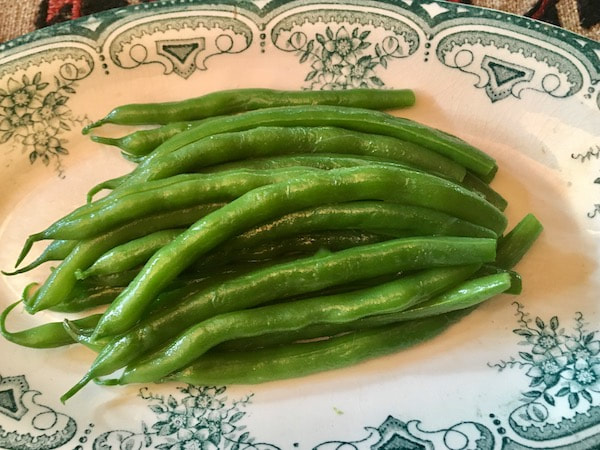
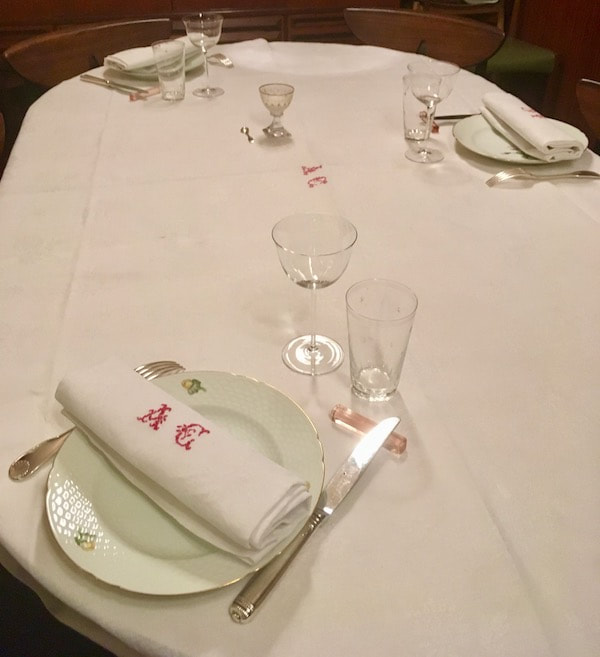
 RSS Feed
RSS Feed
